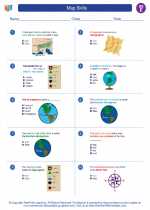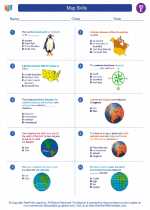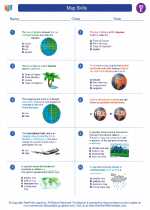Map Skills
Map skills are an important part of understanding geography and navigating the world around us. They involve the ability to read and interpret different types of maps, understand key geographic features, and use coordinates to locate specific places.
Key Concepts
- Types of Maps: There are different types of maps, including physical maps that show geographical features such as mountains and rivers, political maps that outline countries and boundaries, and thematic maps that focus on specific themes like population density or climate.
- Map Symbols: Maps use symbols to represent features like roads, buildings, and natural landmarks. Understanding these symbols is essential for interpreting a map accurately.
- Direction and Scale: Maps indicate direction using a compass rose, and scale to show the relationship between distance on the map and actual distance on the ground.
- Latitude and Longitude: These are the imaginary lines used to locate places on the Earth's surface. Latitude lines run east-west, while longitude lines run north-south.
- Reading Coordinates: Coordinates are used to pinpoint a specific location on a map, given by its latitude and longitude.
- Map Projections: Maps are flat representations of the spherical Earth, and different map projections can distort the size and shape of landmasses.
Study Tips
- Practice Reading Maps: Look at different types of maps and try to identify key features, symbols, and scales.
- Use Coordinates: Practice locating specific places using latitude and longitude coordinates.
- Understand Map Projections: Explore how different map projections can distort the representation of the Earth's surface.
- Field Trips: Visit local landmarks and use maps to navigate, understand scale, and direction.
- Online Resources: Use online map tools and resources to practice map skills and explore different map types.
Conclusion
Map skills are essential for understanding the world around us and are valuable for activities such as travel, navigation, and understanding global geography. By understanding the key concepts and practicing map skills, you can enhance your ability to interpret and use maps effectively.
[Map Skills] Related Worksheets and Study Guides:
.◂Social Studies Worksheets and Study Guides Fifth Grade. Map Skills
The resources above cover the following skills:
National Curriculum Standards for Social Studies (NCSS)
TIME, CONTINUITY, AND CHANGE
SOCIAL STUDIES PROGRAMS SHOULD INCLUDE EXPERIENCES THAT PROVIDE FOR THE STUDY OF THE PAST AND ITS LEGACY.
PROCESSES - Learners will be able to:
Identify and use a variety of primary and secondary sources for reconstructing the past, such as documents, letters, diaries, maps, textbooks, photos, and other sources.
Research and analyze past periods, events, and issues, using a variety of primary sources (e.g., documents, letters, artifacts, and testimony) as well as secondary sources; validate and weigh evidence for claims, and evaluate the usefulness and degree of reliability of sources to develop a supportable interpretation.
PEOPLE, PLACES, AND ENVIRONMENTS
SOCIAL STUDIES PROGRAMS SHOULD INCLUDE EXPERIENCES THAT PROVIDE FOR THE STUDY OF PEOPLE, PLACES, AND ENVIRONMENTS.
KNOWLEDGE - Learners will understand:
The use of a variety of maps, globes, graphic representations, and geospatial technologies to help investigate the relationships among people, places, and environments.
PROCESSES - Learners will be able to:
Research, organize, analyze, synthesize, and evaluate information from atlases, data bases, grid systems, charts, graphs, maps, geospatial technologies, and other tools to interpret relationships among geographic factors and historic events.
GLOBAL CONNECTIONS
SOCIAL STUDIES PROGRAMS SHOULD INCLUDE EXPERIENCES THAT PROVIDE FOR THE STUDY OF GLOBAL CONNECTIONS AND INTERDEPENDENCE.
PROCESSES - Learners will be able to:
Use maps, charts, and databases to explore patterns and predict trends regarding global connections at the community, state, or national level.



